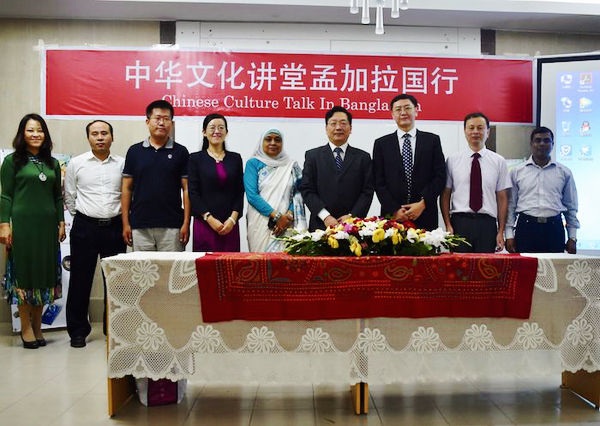 |
|
Lectures on traditional Chinese medicine were held in Bangladesh from Oct 9 to 10, 2017. [Photo/Chinaculture.org] |
Lectures on traditional Chinese medicine, part of the "Chinese Culture Talk" series, were held in Bangladesh and Nepal from Oct 9 to 13.
The lectures were given by two scholars, Fu Yanling and Zhang Lin, from the Beijing University of Chinese Medicine, and professor Lyu Zhong from Hangzhou Huqingyutang Pharmacy.
The first event in Bangladesh was held at University of Dhaka on Oct 9. The three scholars introduced the philosophy of traditional Chinese medicine, as well as its theory and application in recent years. To help local people learn better, the scholars demonstrated the usage of acupuncture, moxibustion, cupping and naprapathy during the event.
The lectures were also held at the Chinese embassies to both countries and Nepal's well-known Kirtipur Hospital.
Many local doctors showed great interest in traditional Chinese medicine and intended to combine the Chinese therapies with their clinical treatment.
The lectures aim to enhance cooperation among countries related to the Belt and Road Initiative and deepen their mutual understanding and relationships.
About Chinese Culture Talk
Launched in 2015 by the Ministry of Culture, Chinese Culture Talk is a series of lectures on Chinese philosophy, religion, literature, cuisine, medicine and traditional culture-related subjects. It is sponsored by the Bureau for External Cultural Relations of the Chinese Ministry of Culture.
The Ministry of Culture selects three or four groups of young and middle-aged scholars to give lectures abroad every year with Chinese embassies, consulates, China Cultural Centers or local agencies around the world planning and organizing lectures or similar activities. Other ministries and social forces in China also send scholars to lecture abroad.
More than 70 activities and lectures have been held in more than 30 countries, including the US, France, Italy, Cambodia and Indonesia.
The content varies from philosophy, religion, cultural heritage, literature and art, costume, cooking and Chinese medicine.